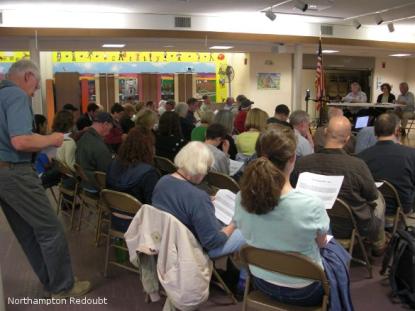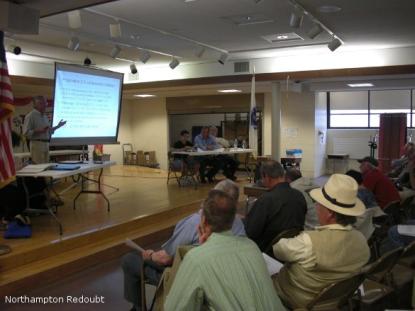Since the local media continues to booster Mayor Higgins' position on the override I'll go with the flow on the topic. I attended last Monday night's override forum held at Bridge Street School and in my view there was no clear winner, if you'll pardon the term. In fact, on the face of it I would say the community is growing more polarized. Above is the video of the meeting as recorded by Adam Cohen of the North Street Neighborhood Association.

While the Ward 3 Neighborhood Association (W3NA) provided a great service for the community, there was an equity issue with the forum. Three pro tax increase panelists spoke in favor of the override for a total of 25 minutes while the two tax increase opponents were allotted 10 minutes by comparison.
This time discrepancy allowed the pro-override team to use a PowerPoint presentation on a large screen that focused primarily on education funding and the impacts of the inflation rate. The gist of the presentation is that Proposition 2 1/2 negatively impacts communities because they can't raise property taxes at the rate of inflation which generally exceeds 2.5%. Though this is true, it's nothing new and some communities do not have $5 million deficits. The mayor and city council increased the city budget 4.7% not two years ago which indicates a business as usual posture in the face of declining state and federal revenues. Incremental cuts should have been made along the way to tighten the city's finances, but those difficult decisions were deferred leading us to the present scenario. Meanwhile, the politicians running the show fail to acknowledge even the least bit of responsibility and the mainstream media sidesteps around the issue for the most part.

With Prop. 2 1/2 in mind municipal officials must rely on new growth that doesn't demand inordinate public services, growth like economic development. For instance, had the mayor pushed for more economic development on Hospital Hill rather than placing such a strong emphasis on housing we might have a more favorable budget condition today. Instead 327 housing units are planned, not counting those from an assisted living facility. Hospital Hill's north campus could have been designed more as a mixed use business incubator rather than as a residential subdivision. The same can be said of King Street, where the restrictive Retail Ordinances enacted in 2002, which I supported at the time, seem to have stifled economic development along that corridor, although there is a new Walgreens soon to open.
The mayor repeatedly states that the city has a revenue problem and not a spending problem. I disagree as the two go together. In general people shouldn't spend money they don't have which means that officials must be frugal when expending taxpayer dollars. Similar to household budgets, officials must distinguish between what a community needs and what a community would like. The ideology displayed by Higgins exemplifies why Proposition 2 1/2 was made law because politicians often can't say no to special interest groups and they keep spending. If Massachusetts were a two-party state there might not be a need for Proposition 2 1/2, but since it is overwhelmingly dominated by the Democratic party as is the city of Northampton, it looks like Prop. 2 1/2 is here to stay.
Unfortunately, during the forum one of the pro-override panelists committed a rhetorical slip and exhibited a winner-takes-all mentality, a mentality that's ruinous to our country regardless of which party is in power at any given time. YES affiliate Pam Schwartz opined that the, "best party," would win the override election. I have a hard time believing that if the override fails Ms. Schwartz would acknowledge that people who voted no comprise, "the best party." Moreover with regards to party politics, there are some liberal Democrats in the city that do not support this tax increase and some registered Republicans who do. This is not about party politics in my view, but rather about giving people other than ourselves control of our money. NO panelist Gene Tacy offered that the tax increase question is dividing the community and added he has neighbors that no longer speak to each other because of their opposing views on the issue. Could it be we are becoming a city of Sneetches?
A recent letter writer to the Gazette implored voters to separate politics from the override vote and hold sitting elected officials accountable later. This is humorous because public budgeting is all about politics. Mayor Higgins has had ten years in office and is in part culpable for Northampton's budget dilemma. One could say the same about many if not all of the city councilors, but then again the council has no budget to speak of with which to independently analyze Higgins' proposals. The mayor basically runs her team of taxpayer funded experts into council chambers and councilors basically say, "uh, okay." In my view the social contract between our elected officials and resident taxpayers is broken and passing a tax increase will allow sitting officials to continue on with business as usual. They want people to focus on the schools and the children now, but if the override passes we'll see more policy proposals like the Education Overlay District, the Hilton Garden Inn, the proposed landfill expansion, the wetlands ordinance and the BID. What's that old saying George Bush misremembered, "fool me once…"
Of the comments made at the forum several concentrated on union negotiations with teachers as written about by Laurie Loisel of the Gazette. I think the article in the June 2 Gazette was accurate with regards to that portion of the evening's conversation, but the report missed many other points that were raised throughout the course of the forum. I wonder why local reporters no longer lift their hands and ask questions during events like this. It seems certain quotes are recorded while others are left off of the page. To me this constitutes opinion journalism masquerading as objective journalism.
For instance, both Gene Tacy and Kathy Silva indicated that they would support a tax increase if it were for one year and not forever.
Then a woman in the audience stated that, and I'm paraphrasing, we've created a crisis in the schools and it's hard to argue with the need for help. But she also wondered what next year will bring, basically implying, when will it end?
In short the override is not just about the schools, though that is the primary focus of proponents who emotionally implore us to save the children as it were. Moreover, recently during a city council public comment period Schwartz stated that if/when the economy turns around the city could vote on an underride that everyone would get behind. To my knowledge this has never been done in Northampton and I wonder how serious she is about that proposal. It seems like people will say anything to convince members of the electorate to vote a certain way. In fact a YES signature ad prepared for publication in the Gazette states (emphasis added):
- This override will raise $2 million in property taxes and requires by law that the money be spent as follows: $1 million to schools, $765,000 to city services such as police, libraries and senior services, $185,000 to Smith Vocational and Agricultural High School and $55,000 to increase the exemptions for low-income seniors.
Please tell us precisely what law is referred to. Since this is neither a menu nor a debt exclusion override city officials could change their minds about how the monies will be allocated if the tax increase passes. For instance, if an unanticipated grant or other fiscal windfall arises the money freed up from the override could be spent in any old fashion. Without citing the specific law this proposed ad from the YES committee is misleading, yet it will be published and sway public opinion. It is estimated the ad will cost between $1,100 and $2,200.
 |
|
When I raised the issue of a split tax rate to more equitably distribute the fiscal burden among the various classes of property in the city, the mayor did not dismiss it out of hand and acknowledged that it is a conversation we could have, although she was not very enthusiastic about the notion. She said that we were talking apples and oranges which is true. I asked a question about apples and she answered with a statement about oranges. The fact is many downtown business owners recently voted to tax themselves in order to create a business improvement district. This indicates that a split tax rate may have some merit and might lessen marginally the property tax burden now shouldered primarily by residential taxpayers. The mayor also clarified my assertion that she stated there would be a 12% cut across all of the city departments. After factoring in departmental increases that would provide level services, she stated the schools would be cut about 5% while general government would be cut about 8% for instance, though she stopped short of indicating whether these figures would be tweaked additionally should the override fail, which was the point of my question. |

